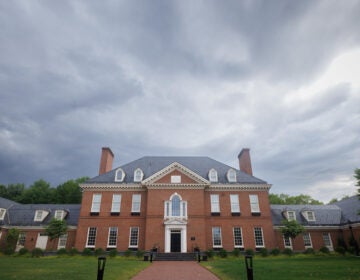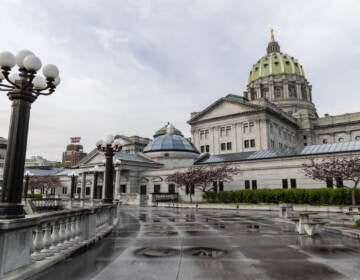Pa. Republicans face decision on constitutional changes package
The comparatively large number of proposals pending in the General Assembly address topics that range from voting rights to abortion and real estate taxes.

A cyclist rides past the Pennsylvania Capitol in Harrisburg, Pa., on March 22, 2021. (AP Photo/Matt Rourke, File)
Republican state lawmakers may soon decide which among the scores of potential amendments to the Pennsylvania Constitution will have any shot of making it to a voter referendum — a tactic that can get politically divisive policies around Democratic Gov. Tom Wolf’s much-used veto pen.
The comparatively large number of proposals pending in the General Assembly address topics that range from voting rights to abortion and real estate taxes.
“Getting constitutional amendments in place so that they can meet their various legal requirements will be a focus of our legislative efforts over the course of the next several weeks,” House Republican caucus spokesperson Jason Gottesman said Monday. “Given the timing necessary to get the questions advertised and on the ballot, it is our goal to have an agreed-to package completed before we recess for the summer.”
A bill introduced by Sen. Dave Argall, R-Schuylkill, to amend the constitution so that gubernatorial candidates could choose their own running mates passed the Senate in April 2021.
But late last year, House Republicans added provisions such as requiring voters to produce IDs and mandating election audits by the state’s elected auditor general.
Despite the current large number of proposed amendments, it’s likely that GOP leaders will permit only a few of them to get to floor votes.
“I think we need to be careful,” Argall said. “We don’t want to put 20 questions on at once.”
Emboldened by their success last year in persuading voters to narrowly approve limits on a governor’s powers during emergencies, House and Senate Republicans have introduced a slew of potential amendments. With action to keep most of them alive needed by early August, the clock is ticking.
Democrats argue that the Republican tactic of making law by amending the constitution undermines democracy by cutting out the executive branch and nearly half the General Assembly.
“I’m afraid we’re setting dangerous precedents, that when we cannot pass legislation across the governor’s desk, and override it with a veto override, we amend our constitution,” state Sen. Amanda Cappelletti, D-Montgomery, said Monday. ”And this behavior, it circumvents the explicit checks and balances of our three branches of government.”
Cappelletti was opposing a procedural step to speed consideration of a constitutional amendment saying there is no right to an abortion or abortion funding in the state constitution. She warned the measure would bring abortion restrictions, bans and litigation.
Democrats are sponsoring some of the 80-plus proposed amendments, but as they party out of power, their proposals are less likely to see the light of day. Republican proposals, meanwhile, seek to eliminate school property taxes, cut House membership by 50 or so seats, privatize the state liquor system and abolish the office of lieutenant governor.
“If these ideas are so popular and so mainstream, why aren’t they making it through the process?” House Minority Leader Joanna McClinton, D-Philadelphia, said last week.
Democratic Rep. Ryan Bizzarro of Erie County has offered an amendment to require two-thirds majorities in both chambers to advance changes to the constitution. Currently they pass with a majority vote.
“We were not elected to govern and legislate by constitutional amendment — that’s not how Pennsylvania government is set up,” Bizzarro said. “If we continue to do this, we are headed down a slippery slope that has the potential to have a devastating effect on Pennsylvanians.”
A constitutional amendment has already passed both chambers this session and awaits action early next year — the proposal to allow a two-year window for lawsuits by child sexual abuse victims who would otherwise be too old to pursue. The Wolf administration’s mishandling of that amendment in early 2021 led to the resignation of the then-secretary of state, Kathy Boockvar.
The state constitution requires proposed amendments to pass both chambers in a two-year legislative session, then be advertised to the public before the next fall election. In the second round that follows, those proposals then must pass both chambers in the following two-year session before going to voters as a referendum for the final say. Amendments do not require the governor’s support.
Most of them are currently in their first two-year session and must be advertised three months ahead of the Nov. 8 election if the Republican majority wants to get them to the finish line at some point during the 2023-24 session that starts in January.
Some of the pending proposals reflect frustration among legislative Republicans with the state’s Democratic-majority state Supreme Court: to elect judges by geographic districts rather than statewide to boost rural Republican-dominated areas; to require judges to run for reelection; and to cut judicial terms tosix years.
State Sen. Doug Mastriano, the Republican nominee for governor, wants to let lawmakers return to session in December of even-numbered years, a gap that he said interfered with his efforts in 2020 to help then-President Donald Trump reverse his reelection loss in the state. Mastriano also seeks to ban “no excuse” mail-in voting under the 2019 law he voted for and require signature verification for absentee ballots.
Other lawmakers want to change the once-a-decade redistricting process, lower the voting age to 16 and allow ranked choice voting.
WHYY is your source for fact-based, in-depth journalism and information. As a nonprofit organization, we rely on financial support from readers like you. Please give today.







